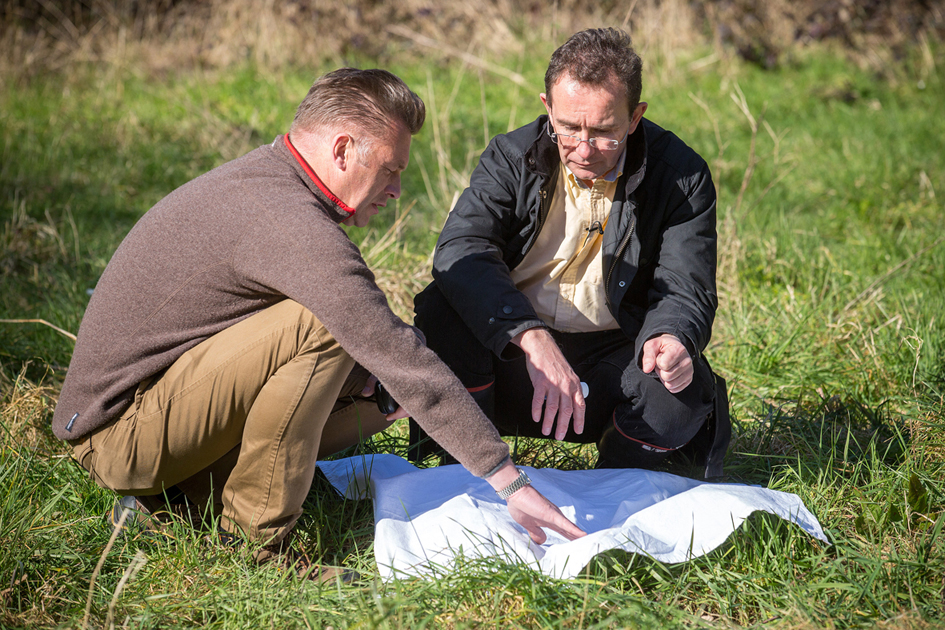Experts behind Britain’s largest-ever study of tick-borne illness in dogs warn vigilance is needed against threat from new diseases such as canine babesiosis
Scientists conducting the Big Tick Project in conjunction with MSD Animal, say recent confirmed cases of Babesia canis in dogs in Essex that had not travelled abroad, have increased the need for surveillance of tick-borne diseases in the UK.
Following confirmed diagnosis of the disease in the dogs, members of The Big Tick Project team at the University of Bristol, led by Professor Richard Wall and TV naturalist Chris Packham visited Forest Veterinary Centre in Harlow where the dogs were treated.
In addition to the potential for tick mapping and greater understanding about what is perceived to be a rise in the risks to dogs and people from Lyme Disease, the emergence in the four dogs in Essex of babesiosis, a life-threatening disease transmitted to dogs by infected ticks usually found in Europe, has highlighted the need for a major investigation on the scale of the Big Tick Project, says Professor Wall.

Professor Wall says: “The recent Babesia cases in Essex are of huge significance. The fact that we now appear to have established populations of the tick Dermacentor reticulatus acting as vectors of the introduced pathogen Babesia canis is a new and important development and a major concern for animal health. It clearly demonstrates the potential dangers from the inadvertent introduction of novel disease pathogens if vigilance and surveillance are not maintained.”
The Big Tick Project study is mapping tick hotspots to identify disease risks. It is hoped that the results of the study will powerfully highlight the challenge that an increasing distribution and prevalence of ticks brings to human and animal health
The results of the project are due later this year and will be released to coincide with the first national Tick Awareness Month this July which is being supported by veterinary practices across the country to raise awareness and improve education aimed at preventing infection amid growing concern over the risk to pets and people from tick-borne disease.
TV presenter, naturalist and dog owner Chris Packham who launched the project said its significance has increased over the course of the past year: “The Big Tick Project is an important study and we are grateful to all the veterinary teams and pet owners whose animals had ticks removed on a visit to the surgery and have taken part in the survey.
“When we launched the study last year, I was struck by the experiences of the people and animals who have suffered the misfortune of contracting Lyme disease which is a horrible infection which can do lasting damage to its victims - both people and animals. The discovery of cases of Babesia canis for the first time in dogs that have not travelled outside the UK is very worrying indeed and underlines the need for greater awareness of the need to protect our pets from ticks.
“Any advance in our knowledge that will help vets and the medical profession support us in protecting our pets and ourselves when enjoying the benefits of the great outdoors has to be welcomed.”
Hannah Newbury MRCVS, technical manager at MSD Animal Health, who has worked alongside the Big Project Team said: “The Big Tick Project has gathered momentum and we have been overwhelmed by the response, support and level of interest from the veterinary profession. The results, which will be available to individual practices and published nationally later this year will be eagerly anticipated not just by veterinary teams but also campaigners for wider education on Lyme disease and other tick-borne illness and in the light of the Babesia canis cases, they can’t come soon enough.”

Debbie White, Practice Manager at Forest Veterinary Centre in Essex which has contributed to the Big Tick Project and which has experience of treating dogs infected with Babesia in recent months, said: “We were pleased to have the opportunity to take part in the Big Tick Project and submitted a number of ticks to the study.
“Given the experience we have had in practice, we will be keen to receive the findings from the Big Tick Project and will be taking part in Tick Awareness Month this summer as we feel it is important to highlight the issue to pet owners.
“The cases of Babesia canis that we have seen in the last few months have highlighted that after a warm, wet winter, ticks are not only active earlier than ever, they are carrying potentially new and harmful disease and we will be encouraging our pet owners to take steps to protect their pets effectively from tick bites.”
To reduce the risk associated with ticks in dogs, veterinary surgeons have innovative and convenient treatments that are only available on prescription. The options available to protect dogs against exposure to ticks include spot-ons (typically applied every four weeks), sprays, collars and oral chewable formulations which can give up to 12 weeks protection. For best advice on how to remove a tick correctly from your pet please speak to your vet.

